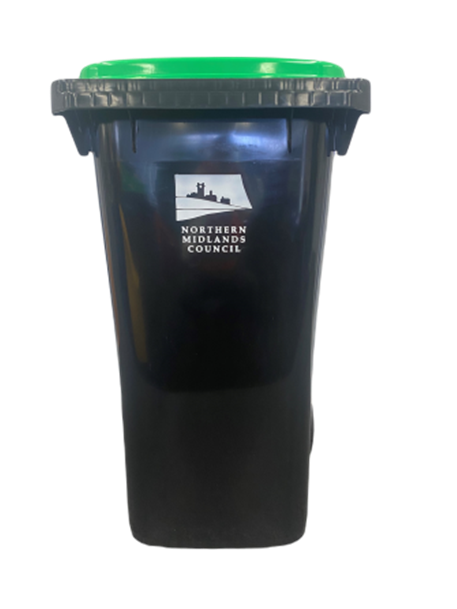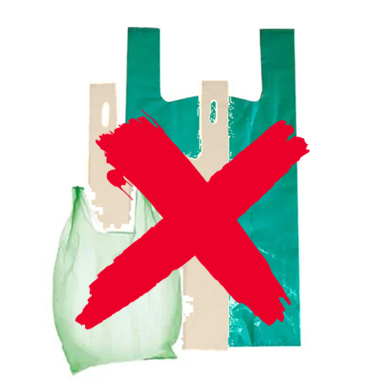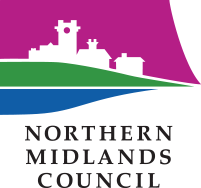- Residents
- Waste Management
-
- General Information
- Waste, Recycling and FOGO Collection
- Kerbside Collection FAQ
- Waste Transfer Stations
- Hazardous Waste
- Animals
-
- Dog Control
- Stock Control
- Native Animals
- Cat Management

Waste, Recycling and FOGO Collection
The Northern Midlands Council offers a fortnightly waste, recycling and FOGO collection. Waste and Recycling week one and FOGO week two, If you have a query relating to this service, please call our Customer Care team on (03) 6397 7303.
For all enquiries regarding missed collections or damaged bins please call the Customer Service Team on (03) 6397 7303
To ensure your Garbage Bin & Recycling Bin & FOGO bins are emptied, please put them both out the night before collection or before 6AM THE MORNING OF COLLECTION. Place all Garbage in bags to prevent items falling out of the bin onto the road during collection.
Waste / Recycling / FOGO Calendars
Download a Calendar - Longford East and Longford West
Download a Calendar - Perth East and Perth West - including all properties along Pateena Road, Sheridan Court, Norwich Drive
Download a Calendar - Campbell Town, Ross, Midland Highway, Epping Forest, Cleveland, Conara, Avoca, Royal George, Rossarden, Kalangadoo, Lake Leake
Download a Calendar - Breadalbane, Devon Hills, Evandale, Nile, Blackwood Creek, Bishopsbourne, Cressy
April 2024
| Sunday | Monday | Tuesday | Wednesday | Thursday | Friday | Saturday |
|---|---|---|---|---|---|---|
|
31
|
6
|
|||||
|
7
|
8
|
9
|
12
|
13
|
||
|
14
|
15
|
20
|
||||
|
21
|
22
|
23
|
26
|
27
|
||
|
28
|
29
|
4
|
Lost / stolen
Waste / Recycling
The charge to replace a wheelie bin is $106.00 for a 140lt bin (waste only) and $110.00 for a 240lt (waste or recycling). However, if you believe you have had your Waste or recycling bin stolen/ missing on your collection day, Council will replace your Waste or Recycling bin free of charge on the first occurrence.
FOGO (Food Organics, Garden Organics)
To replace a FOGO bin a charge of $110.00 applies.
To apply for a replacement bin, please contact us on 63977303. Please allow 10 working days for delivery of your new bin.
New Bins
For recently completed dwellings bins are sent out free of charge on request. We don't send bins out until a certificate of occupancy has been issued. If your dwelling is nearing completion, please give us a call let us know what size service you require.
A replacement charge will apply if the owner requests bins to be sent out to an unoccupied property and bins are stolen before tenant/owner moves in.
Damaged waste or recycling or FOGO bin
Council will repair free of charge your waste or recycling or FOGO bin, if your bin cannot be repaired a new one will be given to you. For damaged bins, wheels missing, broken lids etc please call us on 63977303 or email on council@nmc.tas.gov.au to request a repair.
Electronic or electrical technology we no longer need or want is called e-waste, and includes things such as computers, monitors, televisions, home entertainment systems, printers, fax machines and mobile phones. Many people have a range of home entertainment systems, and a home office or study with printers, scanners, photocopiers and computers, so it’s worthwhile spending some time to consider how you can reduce waste and save money in your home.
It’s really important to dispose of e-waste thoughtfully and correctly to help protect our environment. Many electronic products contain harmful substances such as lead and mercury which can be released into the environment if not disposed of or recycled in an appropriate way.
Many electronic and electrical products contain parts that can be recycled and used again. When you recycle, you stop solid and hazardous waste going to landfill and save resources which can be used to manufacture new products. Televisions, computers and other e-waste contain non-renewable resources such as tin, nickel, zinc aluminium and copper which can't be used again if they are sent to landfill. E-waste also contains hazardous elements such as lead and mercury. Sending these products to landfill means there is a risk that the hazardous substances may be released into the environment. Examples of hazardous waste in electrical and electronic products include:
- mobile phones - arsenic and lead
- printer inks and toners - often contain carbon black and cadmium
- older style cathode ray tube (CRT) monitors - contain about 20 per cent lead
- CRTs are also used in older televisions, and with high definition televisions on the market, a surplus of unwanted old-style televisions is adding to the rising amount of e-waste. In 2007-08, 16.8 million TVs and computers were discarded in Australia, with 84 per cent of these sent to landfill.
When not disposed of properly, the toxins from e-waste can escape from the landfill, seep into groundwater, contaminate the soil and enter the food chain causing serious health problems.
E-Waste that can be recycled includes:
- mobile phones and telephone systems
- stereo components, DVD and video players
- televisions
- computers and accessories
- printers, faxes and scanners
- batteries
- cartridges
Mobile Phones
- Longford Council Chambers
- All Australia Post offices located within the muncipality
Cartridges
- Longford Council Chambers
- All Australia Post Offices located within the municipality
Computer / Printers / Televisions - Please view the Tasmanian Recycling Directory, see the link below.
For further information on where to recycle follow this link to the recycling near you directory.
Collection Schedule

When FOGO (organic matter) is trapped in landfill, FOGO produces methane, a potent greenhouse gas that harms the atmosphere and environment. The FOGO materials collected in a single bin, are used to create compost or soil conditioner.
Collecting the FOGO material also reduces the amount of waste going to landfill and provides an easy way for residents to actively make a positive difference to our environment.
Collection services are fortnightly on the opposite week of your waste/recycling collection, the size of the FOGO bin is 240L
Food Organics

- Fruit & vegetable scraps, including citrus
- De-packaged out-of-date/left-over food
- Meat, bones & eggshells
- Bread, pasta & rice
- Tea leaves & coffee grounds
- Dairy products
- Seafood
- Take away food
- Baked goods
- Pizza boxes
- Paper towel & used tissues
Garden Organics
- Pruning
- Grass clippings
- Weeds
- Branches - Maximum 100mm Diameter
- Plants
- Small shrubs
- Twigs (no logs)
- Leaves & flowers
- Untreated timber (no logs)
- Newspaper
- Shredded paper
- Hair & fur
If in doubt, leave it out!
DO NOT place any of the following items in your FOGO bin.
- Clinical, medical or pharmaceutical wastes
- Concrete, rocks, ceramics, stones, bricks
- E-waste
- Food packaging
- Glass
- Garden hoses
- Batteries, light globes, gas bottles, paint
- Liquids
- Metals
- Nappies
- Plant pots
- Plastics
- Soil
- Tree stumps
- Treated, painted, stained or laminated timber, particleboard or plywood
- Bags – plastics, compostable or biodegradable
Bags are No-Go, for FOGO

Bags of any kind are unable to be processed at the FOGO composting facility.
Many so-called compostable bags or caddy liners on supermarket shelves are not truly compostable.
Use paper towel or newspaper to line your bin or dry material like leaves or shredded paper to help prevent food scraps from sticking.
If you accidentally dispose of something that should not go in your FOGO bin, carefully retrieve it and place it in the correct bin.
What is the FOGO kerbside collection?
FOGO stands for Food Organics Garden Organics. The FOGO kerbside collection is for food and garden waste such as
kitchen scraps, lawn clippings, small branches and garden debris.
Material from the FOGO bin (lime green lid) will be collected fortnightly on the alternate week to your recycling bin (yellow lid).
What are the benefits of the FOGO service?
The service is an easy way for householders to actively make a positive difference to our environment. The collection of FOGO material reduces the amount of waste going to landfill, greenhouse gas emissions and produces quality compost. FOGO material is 100% processed at the Launceston Waste Centre's new organic processing facility.
The composting process is undertaken with forced aeration technology to ensure the material is kept aerobic so that the microbes can convert the product into usable compost. The process follows strict quality standards (AS4454-2012) to ensure the compost product is free of weed seeds and pathogens.
What are the benefits of compost to soils?
Compost is a source of slow-release nutrients for soils. Improving the structure of soils, compost increases water retention,
soil carbon and enhances overall soil health providing a super food for plants.
What is the cost for this service?
This service is being provided at no additional cost to ratepayers, there is no ongoing yearly fee.
I already compost my garden and food scraps so why do I need a FOGO bin?
FOGO allows you to dispose of more items than a standard household compost system including perennial weeds, dairy,
meat and bones, avoiding the need for these items to go to general waste.
When do I put the FOGO bin out?
The FOGO bin (lime green lid) is collected fortnightly on the opposite week of your recycling bin (yellow lid). Place your bin out
by 6am on the morning of collection.
What happens if my bin is too heavy?
The maximum weight is 80kg. The mechanical arm on the collection vehicle cannot lift bins over this weight. Your will be required to remove some organic material and wait two weeks until the next collection.
How can I keep my FOGO below 80kgs?
- Mow lawns when they are dry (wet grass is heavier than dry).
- Ensure leaf matter and clippings are dry.
- Aerate the FOGO from time to time to release moisture.
- Follow the "what can", and "what can't" go in the FOGO bin guides.
- Shake soil off all weeds and unwanted plants.
- Don't add large limbs or trunks from trees and shrubs.
Can I use compostable or biodegradable bags?
No. We cannot accept plastic, compostable or biodegradable bags or liners of any kind. Plastic contamination in compost is
difficult to remove. Due to the many different types of compostable and biodegradable bags on the market, it can result in
people using the wrong type and unknowingly contaminate the product. Line your kitchen caddy or bin with newspaper or paper
towel, which can also be used to wrap your organic waste before placing it in the FOGO bin.
Home Composting

Home composting is a good way to significantly reduce your household waste. When composted, food waste and garden clippings decompose to make a great mulch for your garden. You can either make your own compost heap in a shady part of your garden or use a compost bin. Compost bins can be purchased at most hardware stores. Items that can be added to compost include:
- vegetable and fruit peelings
- tea bags and coffee grinds
- vacuume dust
- small purnings, leaves and grass clippings
- straw and sawdust
- flowers
- wood ash
- shredded paper and cardboard
- used potting mix
The compost should be added in layers, with a layer of food scraps ideally being covered with a layer of grass clippings or leaves.
The following items are not suitable for composting:
- meat and bones
- dairy products
- large prunings
- pet droppings
- weeds with seeds
- bleached paper or magazines
The compost needs moisture and air to decompose effectively. To achieve this, turn it regularly and make sure it is always kept reasonably moist, without being waterlogged. For further information on home composting follow this link to the Living Greener website.
Worm Farms
Worm farms are another way to reduce food and garden waste. Worm castings that result from the worm's decomposition of waste also make an excellent soil conditioner for your garden. As with compost heaps, a worm farm should be placed in a cool and shady part of the garden. The worms need:
- a dark, moist, but not waterlogged environment at all times
- any compostable food items, shredded into smaller pieces to allow the worms to efficiently decompose them
